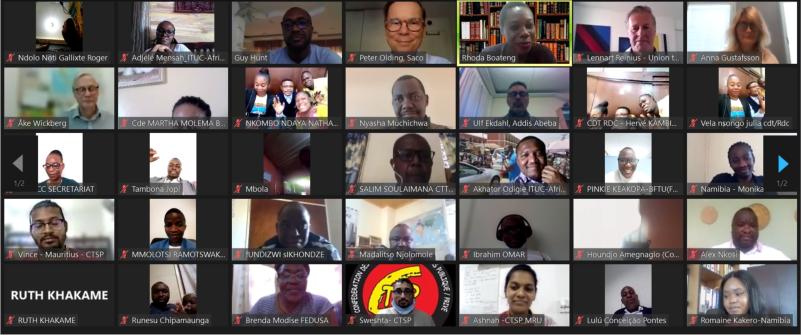
The 12th of August is annually commemorated as an international youth day. To grace this important day the African Regional Organisation of the International Trade Union Confederation (ITUC-Africa) in collaboration with Union to Union and the Swedish Embassy launched a project titled, Increasing youth awareness and mobilization around labour standards and trade union rights in the Southern Africa region.
The project which will be financially supported by SIDA through the Swedish Embassy in Ethiopia, will be implemented in 14 countries (Angola, Botswana, Comoros, the Democratic Republic of Congo, Eswatini, Madagascar, Malawi, Mauritius, Mozambique, Namibia, South Africa, Tanzania, Zambia and Zimbabwe) in Southern African. Among other things, the project aims at increasing youth awareness and mobilization around labour standards and trade union rights in the Southern Africa region. The project will focus on the promotion of youths’ organizing and labour rights during the Covid-19 pandemic while scaling up trade union contribution to improving workplace and community health and safety and wellbeing for more long-term development.
Speaking during the launch, the General Secretary for ITUC-Africa, Kwasi Adu-Amankwah intimated that “a strong, dynamic and empowered youth is critical in catalyzing and driving the transformation of our continent as envisioned in ‘the Africa Vision 2063, the Africa we want’. ITUC-Africa takes the youth question very seriously because the very survival of trade union movement rests squarely on our ability to mobilise, organise and integrate the youth into the movement”. The Deputy General Secretary, Akhator Joel Odigie, who will provide oversight over the project also collaborated the GS by emphasising that the “project attests to the historical and progressive international cooperation between Sweden and Africa. It is one relationship that is built on solidarity, mutual respect, and consciousness to advancing social justice for all. This project also acknowledges the roles of trade unions in the mobilisation of the people for change, especially the mobilisation of the agencies at the disposal of young people. We are confident that trade unions, youth, and young workers in Southern African will take full and effective advantages of this project to advance the benefits set out in the project".
In his speech, the Swedish Ambassador for Ethiopia, His Excellency Hans Henric Lundquist explained that SIDA has given the project grant in line with its international cooperation priorities that aim to promote democracy, the promotion of human rights, social dialogue and decent work.
By some estimates, Africa’s working-age population will grow by approximately 450 million people—about 3 percent per annum—between 2015 and 2035. By 2050, Africa will have 362 million young people between the ages of 15 and 24 years old. The question for reflection during the launch was, where will the region find the jobs for such a rapidly growing young population? With Africa’s youth bulge be a demographic dividend or a demographic bomb?
Despite their significant present and future numbers, young people are often faced with age-related challenges and barriers to participation in economic, political and social life, greatly hindering their development and, by extension, sustainable development. Thus, Africa trade unions will have to effectively involve the youth in addressing key aspects such as protecting their health and well-being, guaranteeing a quality education and the freedom to participate in trade union activities and leadership, working with young people to secure decent work opportunities, and addressing the other myriad challenges young people face. The active engagement of youth in sustainable development efforts is central to achieving SDGs and the AU Agenda 2063 as it leads to creating inclusive economic growth, political stability and peaceful societies (SDG 16) because an army of idle youth has the potential to engage in illicit and consequential activities.
Inequality in human capacities formation is one of the major impediments for our youth and militates against inclusive growth. Young people experience a diverse set of challenges across socio-economic, geographical, political and cultural divides during their transition from adolescence to adulthood. In today’s labour market, the transition from school to work is particularly challenging. Young people are striving to achieve economic independence and to find their identity against the background of weakening family and community structures as well as educational systems that often do not equip them with skills demanded in the labour market. The current generation of youth in Africa is also the largest the continent has ever seen. But the growth of Africa’s economies has not been successful in absorbing the youth into the labour market. As a growing continent with small and inadequate employment opportunities, most young people are employed in a precarious, undesirable and low-value addition informal economy that falls short of providing decent jobs.
It is hoped that the project will assist the unions in Africa to organise their youths and strengthen the renewal process. Indeed, trade unions in Africa need new energies and vibrant activism to increase the pressure on social partners. And with the ageing and shrinking membership, the recruitment of more members, especially young people, would reorganize the power of unions and strengthen the future relevance of the labour movement.
